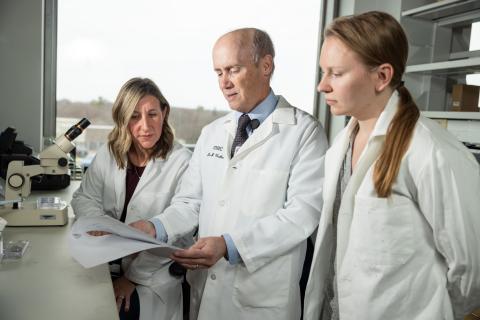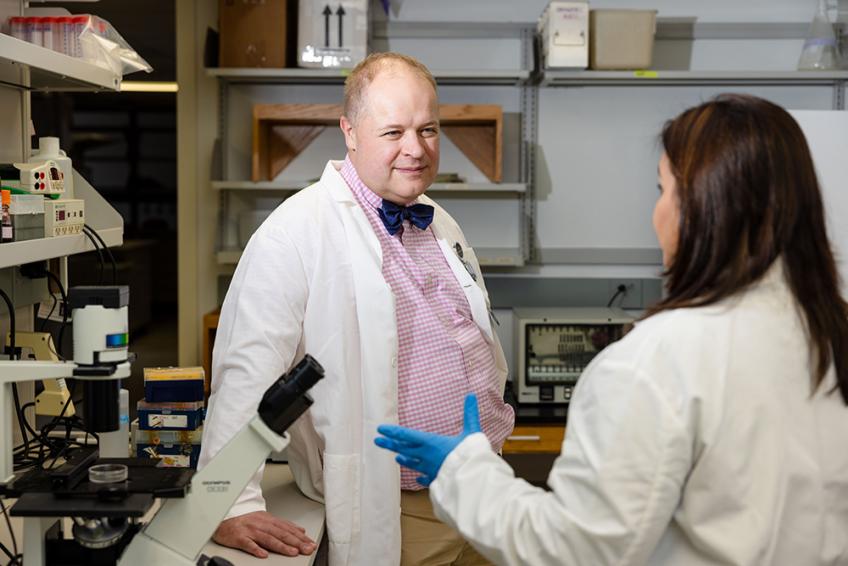Table of ContentsClose
'C' To Believe
Once dismissed, high-dose vitamin C is proving to be a powerful—and cost-effective—cancer treatment.
As a cancer-fighting organic compound, University of Iowa researchers knew vitamin C worked in cells. They knew it worked in mice. They even knew it worked in a small group of cancer patients.
What the Iowa team didn't know was how well it could work—so well, in fact, that they ended a phase 2 clinical trial early.
The trial examined the impact of adding high-dose intravenous (IV) vitamin C (ascorbate) to standard chemotherapy treatments for 34 patients with Stage 4 metastatic pancreatic cancer. The results of the phase 2 trial—published in the November 2024 issue of Redox Biology—found that the patients' survival rates doubled from eight months to 16 months, and progression-free survival stretched from three months to six.
"When we started the trial, we thought it would be successful to get to 12 months of survival. Instead, we doubled it," says Joseph Cullen (86MD, 91R), professor of surgery and radiation oncology, and the study's senior author.
Many of the patients in the study didn't just live longer—they also appeared to feel better.
"What's really cool is that if you look at the group who received the vitamin C treatment, they got higher doses of chemotherapy for longer periods,” Cullen says. “They seemed to tolerate the chemotherapy better."
Decades of research at Iowa has shown that vitamin C, when given intravenously, can build up in high levels in the blood, creating unique chemical reactions that make cancer cells more vulnerable to chemotherapy and radiation treatments. Cullen notes that with one of the research team’s phase 1 trials for pancreatic cancer—combining high-dose, IV vitamin C with radiation treatments—three patients are now long-term cancer survivors.
"They've lived nine years since their diagnosis at this point, which is far beyond the typical survival range," Cullen says.
Iowa researchers are now conducting several new trials exploring different vitamin C treatments and their effects on a wide range of cancers.

The treatment that almost never was
These breakthrough vitamin C treatments aren't necessarily a reversal of fortune—rather of reputation.
"For years, vitamin C was associated with quack medicine," Cullen says, mainly due to a fateful misunderstanding.
Chemist Linus Pauling championed the potential for huge amounts of vitamin C to kill cancer cells in the 1970s. His research found that when cancer patients received high doses of vitamin C, they lived four times longer than those who didn't get the treatment.
Later, when Mayo Clinic researchers attempted to recreate Pauling's findings, they concluded that vitamin C offered no benefit in cancer patients' symptoms or survival rates. The idea that vitamin C could be a cancer-killing component was essentially dropped for 30 years.
That is until National Institutes of Health scientist Mark Levine uncovered a key difference in the research: The Mayo Clinic researchers gave patients vitamin C orally.
"No matter how much vitamin C you take orally, you can't get anywhere near enough of the massive doses needed to kill cancer cells," Cullen says.
The body gets rid of excess vitamin C through the kidneys or decreased gut absorption, so not enough vitamin C can build up in the blood to be effective.
"At low levels, when you take oral vitamin C, it acts as an antioxidant, but when we give it at high levels intravenously, it acts as a pro-oxidant," Cullen explains.
It is precisely this pro-oxidization effect that kills cancer cells. Tumor cells typically have higher levels of reactive oxygen species (ROS), a type of unstable molecule that can be exploited. High levels of vitamin C in the blood raise ROS levels in tumor cells, which causes oxidative stress that can damage and kill those cells. The process also makes cancerous cells more susceptible to chemotherapy and radiation, Cullen says. Normal cells, meanwhile, are unharmed.
After Levine's discovery, he and chemist Garry Buettner (69MS, 76PhD), a UI professor of radiation oncology, conducted their own research and presented their results to UI cancer physicians, including Cullen. Their work spurred a new age of vitamin C cancer clinical trials.
Improving quality of life
At Iowa, the promising vitamin C research extends beyond the pancreatic trial. A phase 2 trial in non-small cell lung cancer is nearing completion, and the results of a phase 2 clinical trial in patients with glioblastoma were published in early 2024 in the journal Clinical Cancer Research. All three trials were funded by a 2018 grant from the National Cancer Institute (NCI).
In the glioblastoma trial, participants who received vitamin C survived five months longer than those who received chemotherapy and radiation alone. For a cancer with a median survival expectancy of just 14.6 months, that's a significant amount of time, says Bryan Allen (08MD/PhD, 13R, 22MBA), professor and chair of the UI Department of Radiation Oncology, and the study's lead researcher.
High-dose vitamin C not only negatively impacts cancer cells; it also protects normal tissue from radiation and toxicity, Allen says, which is why many people who received treatment reported feeling better than those who didn't.
"This wasn't five months sick in bed. This was five months out living life," Allen says.
However, not all trial participants benefited equally. While some patients saw staggeringly positive results, Allen says, others saw small benefits, and some experienced no benefit. UI Health Care researchers are now studying likely explanations, including the role that iron stores play in patient survival.


Cancer Clinical Trials
UI Health Care Holden Comprehensive Cancer Center is offering more clinical trials than ever before.
The future of vitamin C treatments
The phase 1 pancreatic and glioblastoma trials showed that vitamin C as an adjunct treatment was safe and well-tolerated. The phase 2 trials showed it could help extend life. A phase 3 trial with a larger and more diverse patient makeup would be the next step.
Interest in such a trial is high, according to Cullen.
"I'm on the phone a lot lately talking about vitamin C," he says.
After all, there’s still a lot to unpack. Researchers don't know the efficacy of higher doses of vitamin C or if follow-up doses would be more useful after chemotherapy or when radiation treatments are completed. And while Cullen is hopeful that high-dose vitamin C will work with most cancers, there's a chance it won't.
Allen, meanwhile, is researching how adding other compounds to vitamin C may further increase ROS in cancer cells. Another UI Health Care team is studying the change that vitamin C causes to tumor cells and what that means for tumor immunology, potentially allowing for even more targeted immunotherapy drugs.
"There are very novel trials being done right now at Iowa," Allen says. "The goal is to benefit as many people as possible."
Despite prior skepticism around vitamin C treatments, this new research is bearing fruit that the juice is indeed worth the squeeze.
Where vitamin C shines

Across the board, cancer treatments have become more personalized, less invasive, and more effective, saving countless lives while also improving the overall treatment experience. Consider the targeted therapies that can be tailored to specific genetic mutations in tumors or immunotherapy medications that can make it harder for cancer cells to evade the immune system.
Despite the crowded innovation field, there is still a place for high-dose, intravenous vitamin C, especially given its combination of effectiveness and low cost, says Bryan Allen, MD, PhD, MBA, professor and chair of the UI Department of Radiation Oncology.
"It's a very cost-effective treatment," he says. "Compared to immunotherapy treatments, which might cost thousands of dollars a dose, vitamin C is in the hundreds of dollars a dose."
That makes vitamin C treatments more affordable and an option to be scaled globally. High-dose vitamin C is also well-tolerated, with few side effects, Allen says. Plus, it’s a known commodity.
"People know what vitamin C is. When patients have heard of something and understand it, they're more willing to try it than something they've never heard of," Allen says.
Photos by Liz Martin
